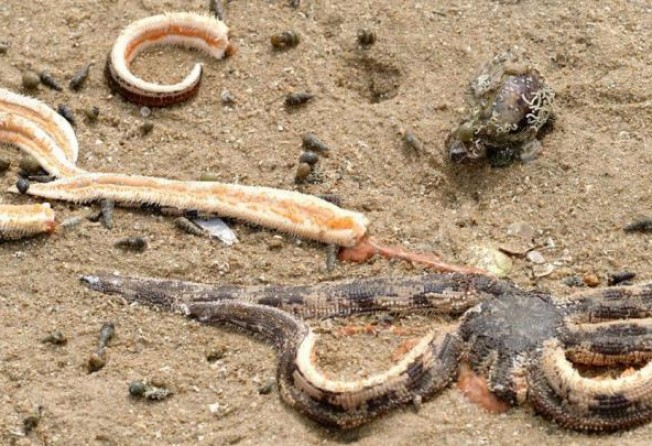Lung Mei beach activists to volunteer as guards after dead wildlife found
Volunteers to patrol shoreline marked for beach after remains of starfish and sea urchins found

Opponents of the Lung Mei man-made beach project have organised a 50-member "ecological guard" to monitor the site after they found remains of starfish and sea urchins littering the area, which is attracting growing numbers of visitors.
The guards, mostly volunteers, will be stationed at the site on the Tai Po coast from 11am to 6pm at weekends and will advise people to use their eyes, not their hands, to appreciate wildlife.
"This should be the duty of the Agriculture, Fisheries and Conservation Department," said Peter Li Siu-man, spokesman for a coalition of 16 groups set up to oppose the project. "But since they have not taken it up, we are forced to do it ourselves."
The group acted after members found dismembered starfish lying on the muddy shore and sea urchins left drying in the sun.
Controversy over the project has attracted growing numbers of visitors to what used to be a little-known spot.
The coalition is organising a class to teach the public about more than 200 species found in the area, including the spotted seahorse, which it says is an endangered species threatened by the HK$200 million project.
Without directly responding, the AFCD appealed to the public to observe its voluntary guidelines for nature appreciation.
Senior marine conservation officer Chow Wing-kuen said education and publicity, rather than more warning signs or rules, were the keys to appreciating nature without damaging it.
"We have progressed much in nature conservation over the past years, and I don't think we are heading in the reverse direction now," he said during a media visit to a site of special scientific interest on Hong Kong Island.
The department can enforce regulations only in marine and country parks where disturbing wildlife is an offence. Other areas such as Lung Mei have no such prohibitions.
Chow also said that a three-day drill to relocate species from Lung Mei to the nearby Ting Kok east coast in July had been successful, with 20 marine animals being moved, and the department was confident the main exercise would go smoothly when beach construction began.
He said the number of creatures requiring removal would be limited because most species were highly mobile.
But Li said the exercise was likely to be far from exhaustive, with some infant star fishes left unnoticed at the work site to die.
Chong Dee-hwa, chairman of the Ichthyological Society of Hong Kong who is involved in relocating fish from the beach, said the ecological impact of the beach should be studied in the broader context of the inner Tolo Harbour in which marine species often circulate and move around.